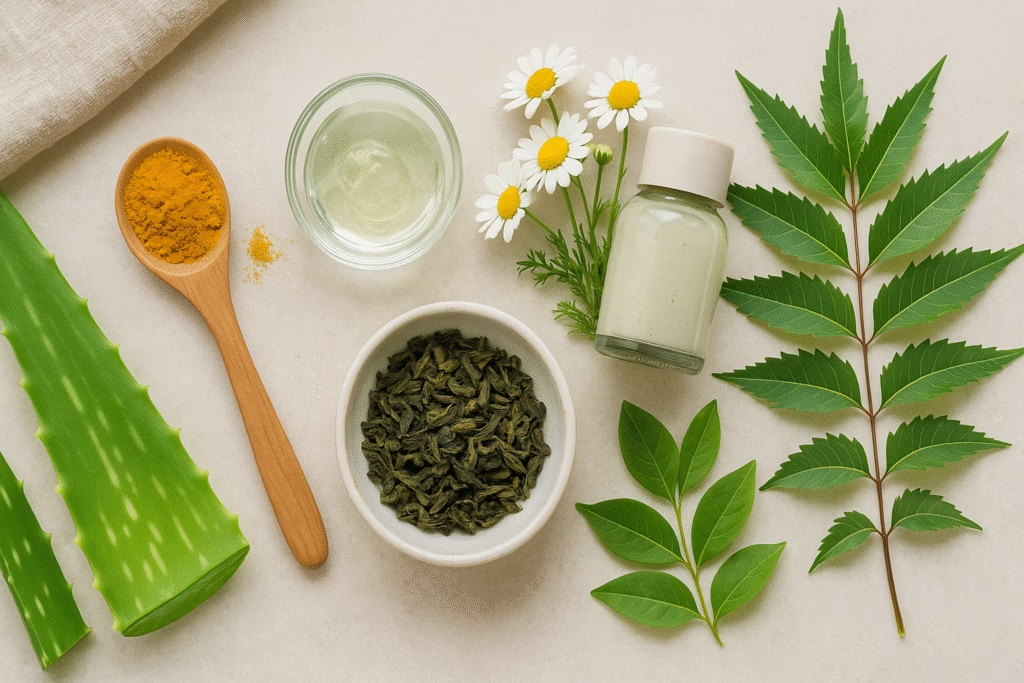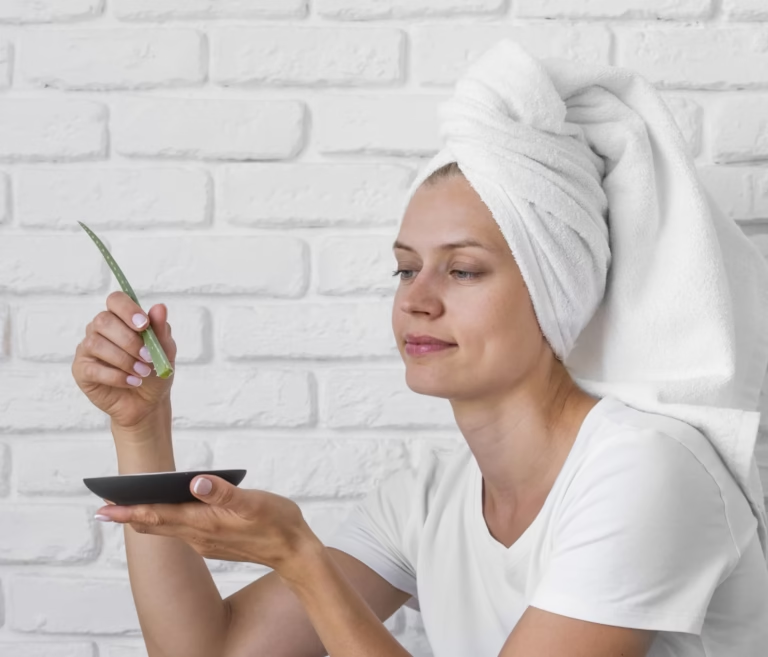
Herbal skin care is the use of plants and natural ingredients to nourish your skin. For centuries, people have relied on herbs because they soothe and heal without the harsh chemicals found in many products today. This is why herbal skincare is often gentle and suitable for people with sensitive skin.
More and more people are turning to herbal skincare because it helps with common problems like dryness, redness, and acne.
This blog post covers five easy herbal remedies that can improve your skin, along with practical ways to use them safely and include them in your daily routine.
Table of Contents
- 1 What Is Herbal Skincare?
- 2 Benefits of Herbal Skincare
- 3 5 Powerful Herbal Remedies for Common Skin Problems
- 4 How to Incorporate Herbal Skincare into Your Routine
- 5 Common Myths About Herbal Skincare
- 6 Allergy and Sensitivity Warning
- 7 Final Thoughts on Herbal Skincare
- 8 Frequently Asked Questions (FAQ)
What Is Herbal Skincare?
Herbal skin care is the practice of using plants, flowers, roots, and other natural ingredients to support healthy skin. This approach has deep roots in traditions like Ayurveda and Indigenous remedies, where herbs have long been used to soothe irritation, clear up acne, and boost your skin’s natural glow.
Why are herbs so useful for skin care? They contain things your skin loves – antioxidants, anti-inflammatory compounds, vitamins and minerals. These ingredients help protect the skin from damage, reduce redness, fight bacteria and aid in healing, all without the harsh side effects of synthetic products.
Herbs that are frequently used in skincare include:
- Aloe vera maintains skin hydrated, soothed, and cool
- Turmeric brightens the skin and relieves inflammation
- Chamomile soothes sensitive or inflamed skin
- Neem fights acne and aids healing
- Green tea extract contains antioxidants that help protect and restore the skin
These herbal solutions for skin care have been around for a long time. They offer real benefits with low risk, which is why many people today are choosing herbal ingredients for skincare.
Benefits of Herbal Skincare
There’s a reason why herbal skincare has been in vogue for so long – it works and is good for your skin. Let’s understand the main benefits:
Gentle for sensitive skin
Many synthetic items contain harsh chemicals, scents, or preservatives that can cause irritation or acne. Herbal skincare uses ingredients like chamomile, aloe vera, and calendula that are naturally soothing. This makes it a good alternative for people with sensitive or easily irritated skin.
Rich in antioxidants and nutrients
Herbs are full of good ingredients like vitamins A, C, and E, as well as antioxidants that protect your skin from damage caused by pollution, sun, and stress. For example, green tea helps fight signs of aging, and turmeric promotes a healthy glow.
Fewer side effects
Since herbal products use simple, natural ingredients, they often cause fewer reactions, especially when you know what’s going on your skin. They’re also usually free of parabens, sulphates, and artificial colours, which are common irritants.
Eco-friendly
Plant-based products are often more sustainable, especially when they’re made with eco-friendly farming and packaging. Choosing herbal skincare means less chemical runoff into water systems and less harm to ecosystems.
Long history of use
Herbs have been trusted for generations. This doesn’t mean every remedy works the same for everyone, but it does show that these ingredients have been used safely by millions of people over time.
The bottom line? Herbal skincare isn’t just a trend. It’s a natural, effective way to care for your skin that has low risks and high benefits.
5 Powerful Herbal Remedies for Common Skin Problems
Let’s take a look at five trusted herbal remedies that can help with everyday skin problems. They are easy to find, easy to use, and have been associated with traditional use for years.
Aloe Vera - Soothing and Hydrating
What it helps with: Sunburn, dry skin, irritation, redness
How to use it: Directly apply the gel from a fresh aloe vera leaf to your skin. If you are using store-bought aloe vera gel, choose one with minimal added ingredients. Allow it to rest for 15 to 20 minutes, or until completely absorbed.
Why it works: Aloe vera is known for its cooling and moisturizing effects. It helps soothe inflamed skin and moisturizes without feeling greasy.
Caution: If you’ve never used aloe vera before, do a patch test to check for any sensitivities.

Turmeric - Anti-inflammatory and brightening
What it helps with: Acne, dark spots, dull skin
How to use it: Combine some turmeric powder with yogurt or honey to create a facial mask. Apply for 10-15 minutes, then rinse thoroughly.
Why it works: Turmeric contains curcumin, which helps reduce inflammation and even out skin tone.
Caution: It can turn your skin a little yellow – don’t use too much and rinse thoroughly.
Green tea extract - Antioxidant protection
What it helps with: Redness, irritation, signs of aging, acne
How to use it: After making green tea and allowing it to cool, use a cotton pad to apply it as a toner. Look for skincare with green tea extract.
Why it works: Green tea contains antioxidants that fight free radicals, reduce inflammation, and promote healing.
Caution: Green tea-infused store-bought products, like all new skincare, should be patch-tested.
Chamomile - calming and anti-redness
What it helps with: Sensitive skin, inflammation, minor rashes
How to use it: Make chamomile tea, cool it, and gently apply it to your skin using a cotton pad or soft towel. You can pour the cooled tea into your bathwater as well.
Why it works: Chamomile is gentle and helps soothe the skin, making it great for those who react to harsh products.
Caution: People with ragweed allergies should use chamomile with caution – it’s from the same plant family.
Neem - Antibacterial and healing
What it helps with: Acne, oily skin, infections, blemishes
How to use it: Use a mixture of neem powder and water, or grind fresh neem leaves into a paste. To prevent irritation or excessive dryness, apply this face mask just once a week.
Why it works: Neem has natural antibacterial and antifungal properties. It helps unclog clogged pores and soothe inflamed acne.
Caution: Neem is very potent; don’t use it every day. Always do a patch test first.
How to Incorporate Herbal Skincare into Your Routine
Trying herbal skincare doesn’t mean you have to change everything overnight. Start small and give your skin time to adjust. Here’s how to do it right:
1. Start with one product or ingredient
Choose one remedy, like aloe vera or chamomile, and use it a few times a week. This helps you see how it works on your skin without overdoing it. If you like it, you can slowly add more herbal ingredients.
2. Read labels when buying products
If you’re buying herbal skincare products, check the ingredients list. Look for clean, simple formulas that have the herbs at the top, not hidden at the bottom. Avoid products loaded with added fragrances, parabens, or alcohol.
3. Try simple DIY recipes
You don’t need fancy equipment or ingredients. You can make a basic face mask at home with turmeric and yogurt or use brewed green tea as a toner. These are low-cost ways to try herbal skincare without using expensive products.
4. Always do a patch test
Even natural ingredients can cause a reaction. Before using any new remedy on your face, apply a small amount to the inside of your arm or behind your ear. Wait 24 hours to see if your skin reacts.
5. Use consistently, not aggressively
Herbal skincare works best over time. You don’t have to use it every day to see results. Be patient and follow a regimen that suits your skin type. Gentle care often leads to lasting results.
For more on herbal remedies and their benefits, see this herbal medicine guide.
Common Myths About Herbal Skincare
There’s a lot of buzz around herbal skincare, but not all of it is true. Let’s bust some myths so you can make better choices.
Myth 1: Natural means no side effects
Just because something is natural doesn’t mean it’s free of risks. Some herbs, like neem or turmeric, can be too strong for certain skin types if used too often or in large amounts. Always test first and use sparingly.
Myth 2: Herbal skincare doesn’t really work
This isn’t true. Many herbs have scientifically proven benefits, like green tea for antioxidants or aloe vera for hydration. Results may take time, but herbal treatments can be just as effective as synthetic treatments, especially for mild skin problems.
Myth 3: If one herb works, more herbs must be better
It’s tempting to mix multiple herbal products or remedies together, but this can backfire on your skin. Too many active ingredients, whether natural or not, can cause irritation. It’s best to start slowly and add one thing at a time.
Myth 4: Herbal products are always clean and safe
Not always. Some products labelled “natural” may contain synthetic preservatives or fragrances. So it’s important to read labels. Look for simple ingredient lists and trusted brands.
The main thing? Herbal skin care can be effective, but it must be used wisely and with caution.
Allergy and Sensitivity Warning
Herbal skin care is generally gentle, but not everyone’s skin reacts the same way. A natural product does not necessarily mean that it is suitable for everyone.
Some herbs—like neem, turmeric, or chamomile—can cause allergies in some people. If you’ve never used a certain ingredient before, it’s always best to err on the side of caution.
There are a few simple steps you can take to be safe:
- Do a patch test first. Apply a small amount of the product or ingredient to the inside of your arm or behind your ear. Wait 24 hours before checking for any redness, itching, or swelling.
- Avoid herbs you’re allergic to. For example, if you’re allergic to ragweed, using chamomile may not be a good choice.
- Stop using it if you experience a skin reaction. If anything burns, stings, or causes discomfort, wash it off and don’t use it again.
- If in doubt, consult a dermatologist, especially if you have sensitive skin or an underlying skin condition.
It’s best to go slowly and listen to how your skin reacts.

Final Thoughts on Herbal Skincare
Herbal skincare is a simple, natural way to take better care of your skin. Whether you’re struggling with dryness, redness, or acne, herbs like aloe vera, turmeric, and chamomile offer real benefits without any harsh chemicals.
The best part? You don’t need a complicated routine. Just one or two herbal remedies, used consistently and safely, can make a real difference. Start small, do a patch test, and note which remedy works for your skin.
Frequently Asked Questions (FAQ)
For sensitive skin, what is the best herbal skincare ingredient?
For sensitive skin, aloe vera and chamomile are top herbal skincare ingredients. They soothe irritation and reduce redness without any harsh chemicals. These herbs are gentle enough to calm inflammation while hydrating and protecting delicate skin.
How long does it take for herbal skincare to start showing results?
Results vary, but many people see improvements within 2 to 4 weeks with continued use. Herbal treatments are gentle, so it’s important to be patient. Regular use of herbal products like a turmeric mask or green tea toner helps to make skin healthier over time.
Can herbal skincare relieve acne and breakouts?
Yes, herbal skincare can be effective against acne. Ingredients like neem and turmeric have natural antibacterial and anti-inflammatory properties that kill acne-causing bacteria and soothe irritated skin. Using an herbal cleanser or mask can reduce breakouts without drying out your skin.
Are herbal skincare products safe for daily use?
Most herbal skincare products are safe for daily use, especially those made with gentle ingredients like aloe vera and green tea. However, some herbs—like neem or turmeric—should be used less often or in smaller amounts. Always patch test new products and alter usage based on your skin’s reaction.
How to make herbal skincare remedies?
You can make easy herbal skincare products using common ingredients like turmeric, honey, aloe vera, and green tea. For example, mix turmeric powder into yogurt to make a brightening mask, or brew green tea and use it as a refreshing toner. Home remedies are cost-effective and help you control what you put on your skin.
You Might Also Like
Explore more thoughtful reads from HolisticVibrance:
